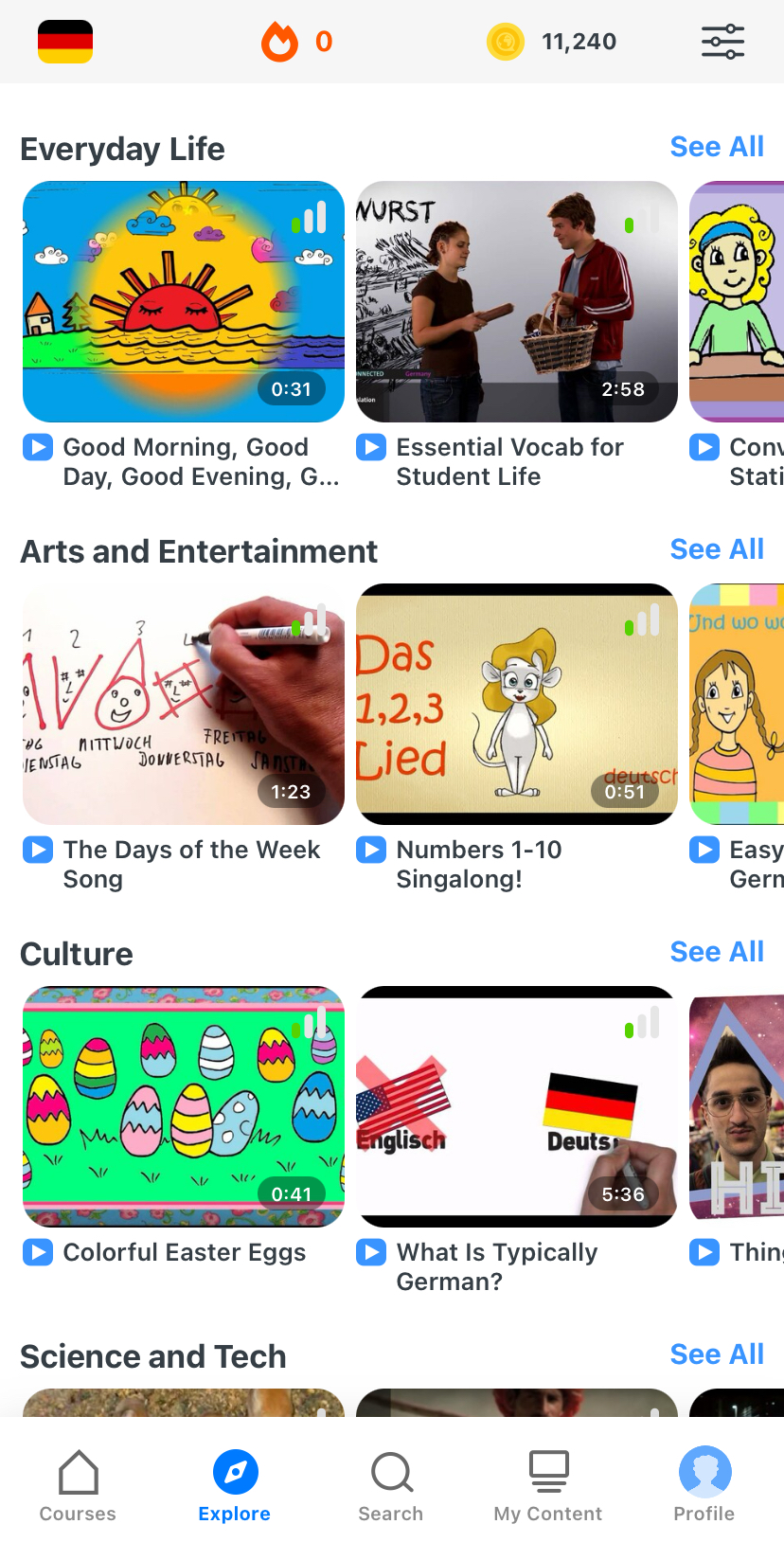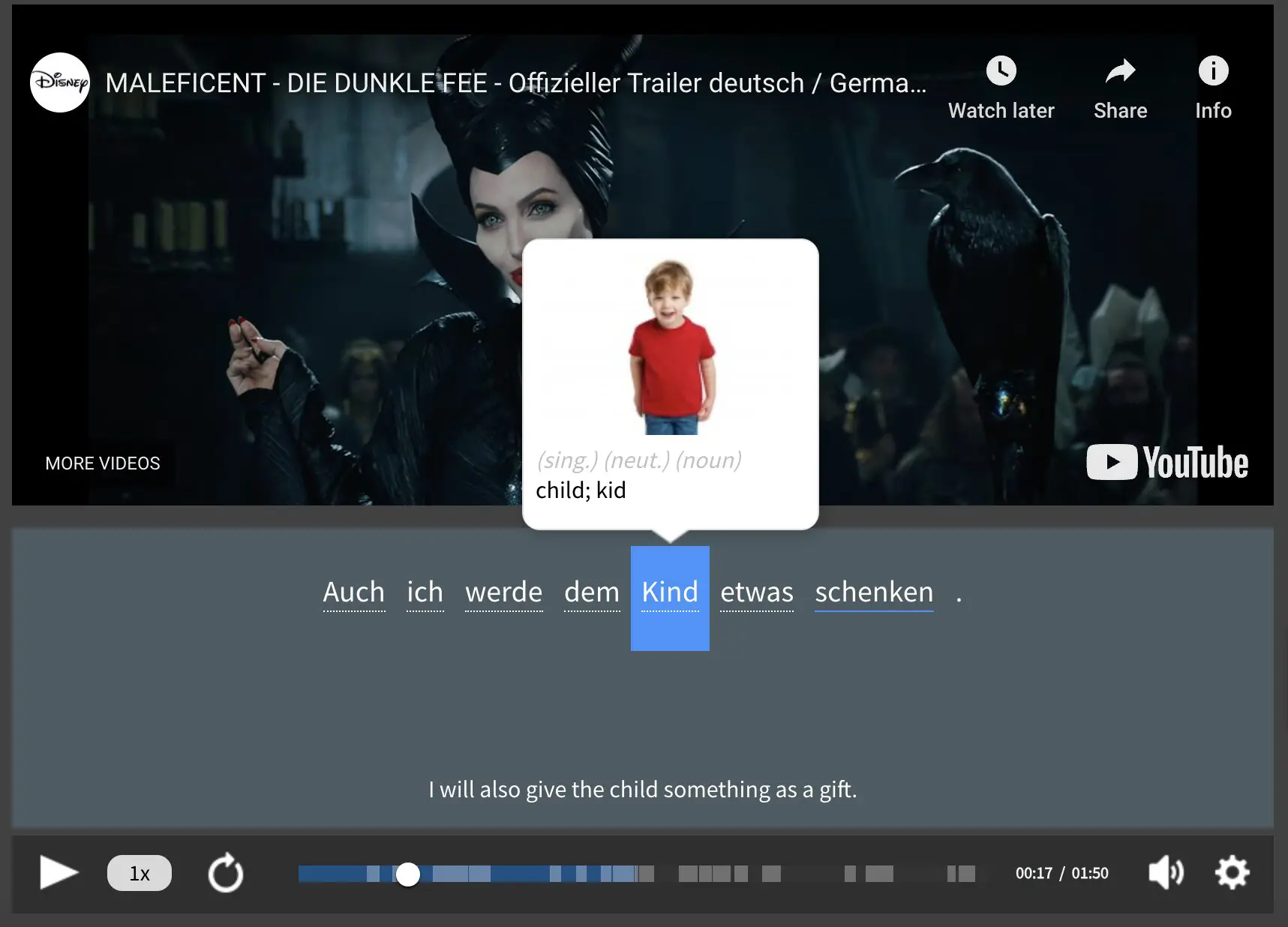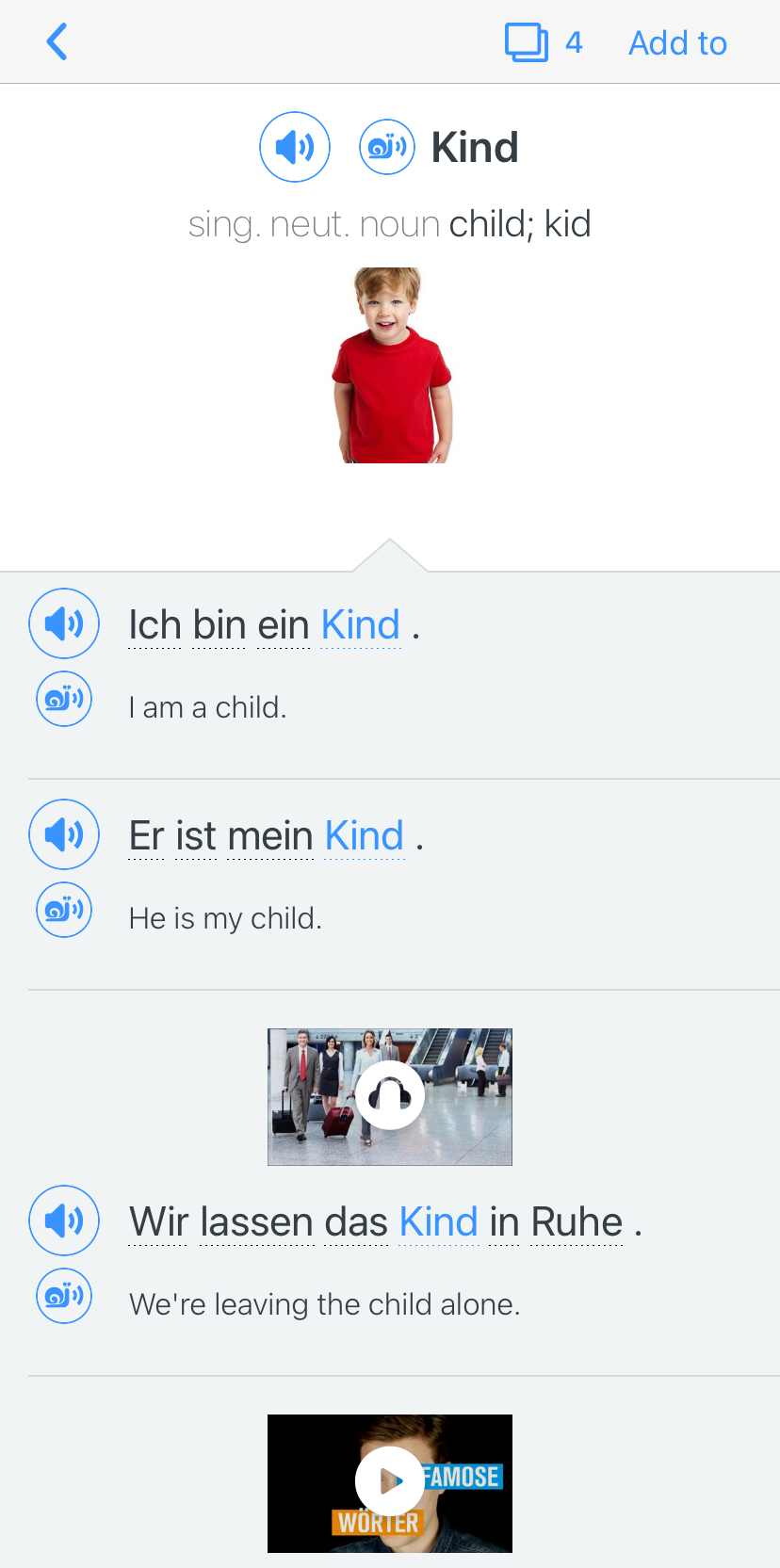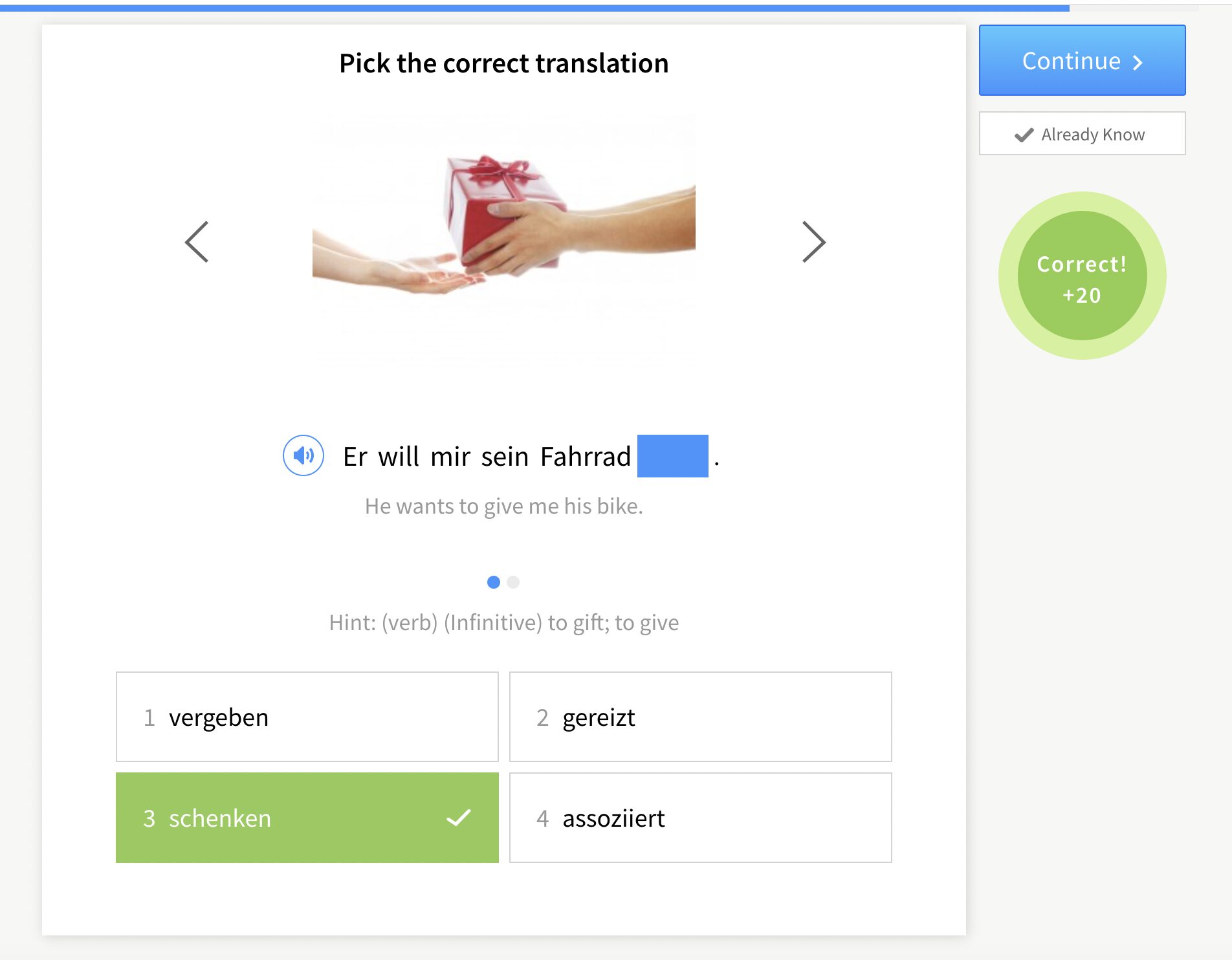Contents
- 1. Hear and Repeat German Letter Sounds
- 2. Build a Stockpile of Some Easy Framework Words
- 3. Expand Your Vocabulary with Nouns, Verbs and Adjectives
- 4. Take Advantage of Spaced Repetition
- 5. Start Stringing Sentences Together
- 6. Memorize Reusable Phrases for Speaking German
- 7. Watch Movies and Videos in German
- 8. Read the News in German
- 9. Start to Think in German
- 10. Build a New Favorite Word Every Day
- 11. Listen to German Podcasts
- 12. Read German Fairy Tales and Children’s Books
- 13. Watch German Comedy
- 14. Make Friends with German Native Speakers
- 15. Invest in a German Dictionary
- 16. Buy a German Textbook
- 17. Read German Translations of English Books
- 18. Find a Stammtisch (Regular Meeting of German Speakers)
- 19. Follow German Twitter Feeds
- 20. Start a Daily Journal in German
- 21. Write Letters to German Pen Pals
- 22. Attend an Immersion Camp or Travel to Germany
- 23. Rock Out to German Music
- 24. Eat Delicious German Food
- How to Approach German as an English Speaker
- And One More Thing…
How to Learn German by Yourself: 24 Easy Steps

Wondering how to learn German by yourself? I was, too—until I actually succeeded. It was a great feeling when I had that first German conversation knowing that I did this all by myself.
The feeling was so great that I wanted to share my secrets and tips with you—the ones that worked really well for me.
When learning German by yourself at home, you have to find out what activities are actually effective, and which ones are really worth your time.
This guide will show you an easy and effective 24-step approach to learning German, plus many fun ways to improve your German speaking and pronunciation skills along the way.
Download: This blog post is available as a convenient and portable PDF that you can take anywhere. Click here to get a copy. (Download)
1. Hear and Repeat German Letter Sounds
Start with learning the German alphabet.
Listen to how each letter sounds on its own compared to letter combinations. Listen for differences between English and German letter sounds, too. Just like in English, two letters together (diphthongs or consonant combinations) can sound quite different from either of the two letters by themselves.
The video below is very useful—a German native speaker will walk you through individual letter sounds and letter combos.
Pay particular attention to the letters with an umlaut (two little dots above the letter), as this changes the way a letter is pronounced.
Once you’ve done that, don’t miss our post on tricky German pronunciations:
The German Pronunciation Guide | FluentU German Blog
Understanding German pronunciation is the first step toward understanding the German language. Once you know how to pronounce each letter and letter combination, you can…
2. Build a Stockpile of Some Easy Framework Words
After you’ve mastered the alphabet and letter sounds, it’s time to learn some framework words. These are easy, super common words that will form the foundation of your vocabulary building.
Think about the words you can’t do without in English, and look up their German equivalents. Fantastic starters are:
You should also check out this list of the 100 most common German words and try to learn a few new ones each day:
100 Most Common German Words | FluentU German Blog
Learning the 100 most common German words is a great way to quickly and effectively boost your comprehension and communication skills. Check out these 100 frequently used…
3. Expand Your Vocabulary with Nouns, Verbs and Adjectives
Once you’ve picked up some basics, it’s time to expand your vocabulary with nouns, verbs and adjectives. Try to set yourself a daily goal—for example, learn three new nouns, verbs and adjectives (for nine words total) every day.
Here are some word lists that you can pull from:
And this helpful video has 100 German adjectives for beginners:
4. Take Advantage of Spaced Repetition
With some vocabulary words already on hand, remember that 15 minutes of German practice every day can be a lot more effective than a few hours every Sunday night. Your brain needs to get used to saying German at the drop of a hat.
You can get this practice in at home. Spaced repetition is a proven memorization technique that incorporates increasing intervals of time between repetitions of words and phrases.
For new words, you’ll have to review them every day or every few days at first, then as they become part of your long-term memory, you’ll see them less and less.
You can try spaced repetition by using flashcards or language apps like Memrise with these activities built in.
5. Start Stringing Sentences Together
Okay, you’ve now gotten pretty familiar with some essential German words. Now it’s time to start using them.
This is all about learning German sentence structure and word order.
You can find a straightforward but thorough explanation of German word order at Dartmouth College’s German Department website.
Then, you can practice using those rules for yourself with these free online exercises—just click a series of words in the correct order to build German sentences.
To read more about German sentence structure and word order, check out this helpful post:
German Sentence Structure: The Simple Guide to German Word Order | FluentU German Blog
Tackle German sentence structure with this complete guide to proper German word order. Go beyond simple SVO sentences to discover the rules of TeKaMoLo and learn when to…
6. Memorize Reusable Phrases for Speaking German
Now you can start hanging out with some basic German phrases. Just like with single words, begin practicing simple phrases that you might say on an average day.
For example, “I would like a soy milk cappuccino please.”
Choose whatever would be most useful for you in daily life in a German-speaking country! This won’t just help you learn how to speak German—it’s also very motivating to imagine a future life living or traveling in Germany.
Here’s a great post that has over 160 common German phrases:
160 Common German Expressions | FluentU German Blog
Knowing common German phrases will help you pick up the language and navigate everyday conversations with ease. Check out these 160 German sentences you should know so you…
7. Watch Movies and Videos in German
Once you can understand some very basic German, try watching a movie you’ve previously seen—but watch it dubbed in German. You could even use English subtitles to make it easier.
For example, here’s our YouTube lesson based on the German-dubbed version of “Friends”:
As your level improves, try watching some German films with German subtitles or German YouTube channels.
You could also watch authentic videos on FluentU.
FluentU takes authentic videos—like music videos, movie trailers, news and inspiring talks—and turns them into personalized language learning lessons.
You can try FluentU for free for 2 weeks. Check out the website or download the iOS app or Android app.
P.S. Click here to take advantage of our current sale! (Expires at the end of this month.)
8. Read the News in German
After getting exposed to some German movies, make sure you’re paying attention to those reading comprehension skills, too. Reading German news is a tried-and-true method to do this.
There are websites like News in Slow German and Sloeful with news articles specifically for German learners.
Highlight or jot down any words that don’t make sense and then look them up later in a German dictionary.
To find some German news resources, see this post:
10 German News Sites for Learners | FluentU German Blog
Looking for German news for learners? Check out our list of 10 German news sources for both learners and native speakers. You’ll find newspapers and websites such as…
9. Start to Think in German
Chances are that, at an advanced level, your mind will automatically switch to German when surrounded by German speakers.
But even at an earlier stage of learning you can consciously try to think in German, at least for a few minutes every day.
Instead of translating words from your mother tongue, try to connect objects directly to German words and phrases. Describe the things around you in German in your head.
Start with simple things such as die Blume ist gelb (the flower is yellow) and gradually move on to more challenging phrases.
10. Build a New Favorite Word Every Day
One of the coolest things about the German language is that you can get creative with it. If there isn’t already a word for what you’re saying,you can make one by sticking other words together—Luftschlosstraum (“daydream,” literally “cloud-castle-dream”), for example. How cool does that sound?
If you can’t think of the word for something but you know some other associated words, try sticking them together and seeing what happens!
While you’re thinking about German words, check out this post to learn 30 unique ones:
11. Listen to German Podcasts
First, check out this post on German learning podcasts.
As an alternative way to concentrate on your German pronunciation while being entertained, podcasts are an intriguing and fun way to learn German.
You can listen to lessons on German idioms, colloquialisms and even some cheeky words to banter with the local Deutschen.
One of the most popular podcasts out there for German learners is GermanPod101. There are hundreds of audio and video lessons, and the collection is always growing with new material for all skill levels.
German audiobooks are another great resource for practicing your listening. Take this up a notch by speaking along with them!
12. Read German Fairy Tales and Children’s Books
According to science, sleep helps our brains to process and store information.
So, why not include a few minutes of German into your bedtime routine?
My personal bedtime favorite is reading German fairy tales, such as “Rotkäppchen” (Little Red Riding Hood) or “Aschenputtel” (Cinderella).
Since fairy tales (and children’s stories) use simpler sentences, so they’re a nice way to build up your vocabulary so you can have more diverse conversations.
Reading comprehension has to start somewhere. Children’s books are charming and fun – plus you’ll gain cultural insights by learning the stories which Germans experience as kids. Some, like the Grimms Märchen (Grimm’s fairy tales) you may be familiar with in their English versions.
You can always choose to read German translations of English stories, like the classic “Die kleine Raupe Nimmersatt“ (“The Very Hungry Caterpillar”) or the adorable “Kleine Eule ganz allein“ (“Little Owl Lost”). Others, like “Die Biene Maja und ihre Abenteuer” (“Maja the Bee and Her Adventures”), may be new to you.
13. Watch German Comedy
Yes, there’s even stand-up comedy about the German language! “What’s So Funny About German” is a 10-part series provided by BBC that features stand-up comedian Henning Wenn.
The series deals with a lot of topics, including the German alphabet, telling the time, politeness, gender and even some jokes. This is one of the most amusing ways to immerse yourself in German and have a laugh at some of the challenging things you have been learning.
You can also check out another one of our video lessons, which features comedian Vincent Pfäfflin discussing his culture shock with German expressions:
14. Make Friends with German Native Speakers
If you want to get comfortable with speaking, it’s super helpful to connect with native German speakers.
There are websites like Tandem (which is based in Berlin), HelloTalk and Speaky that help you connect with language exchange partners. Exchange some text messages, do a video chat or ask if you can call them up.
You could also go to a German restaurant, practice ordering with the waitstaff and try to have a fluent German conversation.
You might get tongue-tied or feel awkward, but the best way to get around this is to not worry about the grammar! Whether you use der, die, dem, das or den, your listeners will still understand you even if the grammar isn’t 100% spot-on.
It’s better to speak as much as possible with the simple structures you do know. The more you speak and listen to people, the more natural and flexible these rules become.
If you’re living in Germany, finding a Sprachpartner (speaking partner) should be easy.
Ask a leading German learning Twitter feed for a retweet to help you find potential partners. The language center of the Humboldt-Universität zu Berlin even has an online tandem databank. Not everyone will be interested in an entirely online language partner, but there are lots of options out there no matter your availability.
15. Invest in a German Dictionary
When you begin to learn a language and start trying to say or understand things, you’re always going to have more questions than answers. A dictionary helps you make progress in this area and allows more spontaneity in your learning. You can always look up words that catch your fancy, regardless of whether they relate to a structured teaching unit or not.
So, which dictionary to buy?
If you’re going for a volume with German-to-English and English-to-German translations, I’d recommend one from the Langenscheidt publishing house. Their language learning aids are high quality across the board, including textbooks and materials for other foreign languages. The bilingual translations are best for beginning learners who would struggle to comprehend new words from solely German descriptions.
If, on the other hand, you want a challenge as you expand your vocabulary, then the German standard dictionary “Duden” is for you. It’s universally respected and offers the definitive guide to past and current conventions relating to Rechtschreibung (orthography).
And of course, don’t forget the Internet – there are many free websites which can help you on the road to fluency. I adore the online dictionary dict.cc for its general accuracy, specificity and breadth of synonyms. Google Translate can also be a useful tool, but refrain from relying on it too heavily. Google is frequently fallible and grammatically suspect, so you’ll need to check for errors along the way.
16. Buy a German Textbook
If you’re already enrolled in a course, you’ll most likely receive a prescribed textbook to buy. But if you’re learning independently or are unsatisfied with your current textbook, this would be a good time to get a well-structured volume that will take you through concepts you want to learn in a style that makes you comfortable.
Having a textbook will give you a better idea of what remains to learn and what gaps still exist in your understanding of grammar and basic conversation. This is especially important for more advanced learners. You might be doing a wonderful job of teaching yourself simple German travel phrases, but a textbook could bring you to the realization (to your chagrin) that you have no idea of how to talk about hypothetical situations. That’s why it’s always good to have a tried-and-true teaching aid on which to fall back.
I would recommend “Deutsch heute” for introductory students. “Kaleidoskop” is ideal for intermediate students and for those who want a stronger focus on German culture and entertainment.
And if you don’t feel like investing in a textbook yet, here’s a post that covers many other free German online resources:
21 Best Tools to Learn German for Free | FluentU German Learner
Did you know you can learn German for free? Fluency in German doesn’t have to come with a price tag. This experienced German learner shares how to learn German for free…
17. Read German Translations of English Books
The next step in the recreational reading progression is to tackle authors who write slightly beyond your vocabulary level, but whose stories you already know. The “Harry Potter” series is a popular starting point. This will allow you to navigate stories filled with new grammar and words, because the general meaning of the narrative is already in your mind. Keep a dictionary close at hand and expand your skills!
Here’s a great list of German books for beginners:
24 German Books for Beginners | FluentU German Blog
These German books for beginners will ease you into reading German, with straightforward language and intriguing storylines. Choose from novellas and novels from different…
18. Find a Stammtisch (Regular Meeting of German Speakers)
Bored with talking to just one German speaker? Now it’s time for you to find an entire group of them! This will be easiest if you live near a university or in a big city. Most college German departments will organize some kind of regular Stammtisch event.
These tend to be made up of students, professors and a few other community members. Non-academic Stammtisch meetings in the States tend to consist mostly of older expats. Go meet them and learn their stories – many of these people have lived fascinating lives and will be happy to tell you all about it.
I recommend Meetup for this. Just select German and more events than you knew existed will show up.
19. Follow German Twitter Feeds
Using the platform Twitter to follow German news, humor, culture and language instruction feeds can be a great way to integrate the learning process into your daily life – especially into mobile situations where a textbook or movie is less convenient. Use those spare minutes spent on public transit, waiting in line or chilling at your favorite coffee shop to get the latest updates on all things German.
20. Start a Daily Journal in German
While it’s easier to get your thoughts down on paper in your native language, challenge yourself to write first in German and skip English entirely. This will force your mind to begin thinking in German, rather than moving through each step of the translation process. Thinking in German is a crucial, significant step toward fluency.
If you need to use a word that you don’t know, try circumlocution. This is the act of describing a concept using an alternative route. Try to think of synonyms or explain the word in German.
Let’s say I don’t know the word for “apple,” but I know the color “red” and the word “tree.” Instead of saying “apple,” I can say “it is red and it grows on a tree.” The idea is that you come at the word or phrase you don’t know via a different path, that still gets you to the same concept.
Afterward, look the word up and if it’s one you’ll need to use a lot, memorize it for future use.
21. Write Letters to German Pen Pals
Build on your journaling exercise by starting to get some real-world German communication. You can find pen pals to write to on websites like MyLanguageExchange and GlobalPenFriends.
If you choose, you can write the letter in English and attempt to write it in German as well and send both. You might also encourage your pen pal to do the same, so they have the opportunity to practice their English.
But eventually you’ll want to move from writing in English and then translating, to writing immediately in German. Again, this will help train your mind to begin thinking in German.
Of course, a more modern version of this exercise is to write emails in German. However some people find that the act of directly writing on paper helps make the process more engaging and memorable.
You can also consider writing to other German learners! The Goethe Institut has courses that will open you to a worldwide community of German students.
22. Attend an Immersion Camp or Travel to Germany
There might be German immersion opportunities closer than you realize! There are a number of camps and programs based in the U.S. where you’ll hear and use only German, day in and day out.
For example, Middlebury College has a famously rigorous total German immersion program. You’ll be speaking and hearing German non-stop, even within the woods of Vermont!
Schulhaus Denver also offers German language classes for all ages and levels. The teachers are native speakers who provide a full immersion learning experience.
Ask your local university’s German department where you can find nearby opportunities similar to these.
The ultimate test of your German knowledge is to spend time in Germany! Apply to be an exchange student and spend a semester or year abroad. Many host families will offer you a fully-immersive experience that’ll allow you to discover the language and culture directly. They can also act as a guide.
23. Rock Out to German Music
Fans of instrumental music may want to skip this tip. Like rock music? Prefer pop? Or maybe you’re more into hip hop? No matter what kind of music you’re into there’s a German language equivalent. Using YouTube, Spotify or even direct from the musicians’ websites, you can easily access music in the German language.
If you don’t know where to get started, the heavy metal of Rammstein, the charming rap/pop of Falco and the feel-good pop of Nena are good places to start, but I’d personally recommend checking out Austrian pop rockers Bilderbuch if you’re looking for fun, catchy songs that you can easily sing along to.
Or, if you prefer a more artsy, thoughtful and poetic take on the German language, long-active Berlin band Einstürzende Neubauten performs to the instrumentation of things like clanging sheet metal and air whooshing through PVC pipes!
An Ohrwurm, or a catchy tune that gets stuck in your head, is a great way to learn German. Just remember to take your time. Listening to a song just once, it can be hard to understand every word being sung, but keep in mind that pop music usually has vocals that are easiest to follow.
Here’s a current playlist of the most popular German music:
Here’s a great post about German music to give you even more ideas:
30 Best Songs to Learn German | FluentU German Blog
Learn German with songs that native speakers love! This is the ultimate list of German songs, from Rammstein to Knef to Kraftwerk. Explore the German language with…
24. Eat Delicious German Food

Jägerschnitzel, Spätzle, and Apfelstrudel aren’t just tasty treats. They can be educational, too. Find an appetizing recipe from websites like ChefKoch.de or German celebrity chefs like Alfons Schuhbeck and the German national soccer team’s chef, Holger Stromberg.
Once you’ve found a dish that whets your appetite, translate the recipe and whip up the results in your own kitchen at home. Your family and friends will definitely thank you for this one—assuming you’re willing to share!
Here’s a great overview video of German cuisine:
How to Approach German as an English Speaker
If you’re an Englisch speaker and wish Deutsch zu sprechen, there are a few things to keep in mind to aid you on your journey to master the German language by yourself.
- German and English actually come from the same language group, the Germanic language group. This can be viewed as a real head start over somebody from another language group. However, while German and English are in the same language group, they share very few similarities.
- The hardest part of the German language would be the grammar. It is one of the few Germanic languages that has kept most of the old fully-inflected grammar, which isn’t too dissimilar from Latin or Russian.
- Sentences are structured in a different way in German compared to the way they are in English. So you have to pay attention to word order and cannot simply replace the words of a sentence with German words. For example, “hilf mir doch mal jemand,” which would literally translate to “somebody me help” in English.
So as you can see, the grammatical side of German can be tricky to learn at the beginning. However, once you get the hang of some grammar, it’s much easier from then on.
Now that you have many tips and tools to succeed, go out there and learn German solo! I promise you it can be done if you follow these steps and work German organically into your life.
Download: This blog post is available as a convenient and portable PDF that you can take anywhere. Click here to get a copy. (Download)
And One More Thing…
If you’re like me and prefer learning German on your own time, from the comfort of your smart device, I’ve got something you’ll love.
With FluentU’s Chrome Extension, you can turn any YouTube or Netflix video with subtitles into an interactive language lesson. That means you can learn German from real-world content, just as native speakers actually use it.
You can even import your favorite YouTube videos into your FluentU account. If you’re not sure where to start, check out our curated library of videos that are handpicked for beginners and intermediate learners, as you can see here:
FluentU brings native German videos within reach. With interactive captions, you can tap on any word to see an image, definition, pronunciation, and useful examples.
You can even see other videos where the word is used in a different context. For example, if I tap on the word "Kind," this is what pops up:
Want to make sure you really remember what you've learned? We’ve got you covered. Practice and reinforce the vocab from each video with learn mode. Swipe to see more examples of the word you’re learning, and play mini-games with our dynamic flashcards.
The best part? FluentU tracks everything you’re learning and uses that to create a personalized experience just for you. You’ll get extra practice with tricky words and even be reminded when it’s time to review—so nothing slips through the cracks.
Start using the FluentU website on your computer or tablet or, better yet, download our app from the App Store or Google Play.
Click here to take advantage of our current sale! (Expires at the end of this month.)












